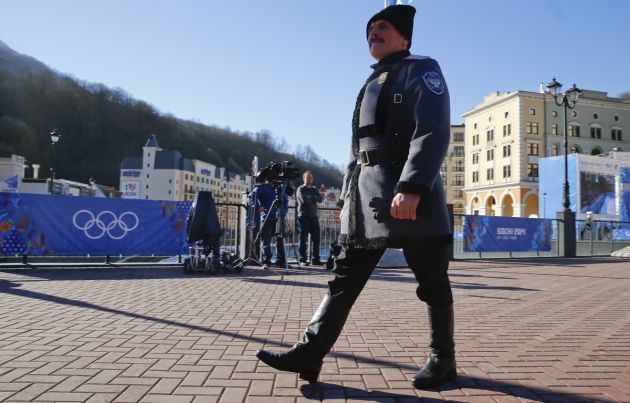Cossacks proud to take stage at Sochi Olympic Games

ROSA KHUTOR, Russia (Reuters) - For centuries they were the free men of the Russian steppe - conquerors of Siberia, defenders of the empire's frontiers and guardians of a warrior culture that to this day is celebrated in legend and song.
At the Winter Olympics in Sochi, the Cossacks are restricted to more prosaic duties: 500 have been deployed to work with police, mainly patrolling streets and stations on the lookout for troublemakers and drunks.
For the beefy figures in grey uniforms and shaggy black wool hats, the cameo role marks one more stage in a vigorous Cossack resurgence since the collapse of the Soviet Union.
"This is an event on a planetary scale: the Winter Olympics are taking place in Russia for the first time," declared Valery Yefremov, deputy ataman (leader) of the 44,000 Cossacks of the Kuban region of southern Russia, which includes Sochi.
"The fact that the Kuban Cossacks are entrusted, together with the police, with serving here and protecting the security of Olympic guests is for us the very highest peak of our service to the Russian state," he told Reuters in an interview in Rosa Khutor, gateway to the snow-sports venues.
BROTHERS-IN-ARMS
For the 22 Cossacks assigned up here, each day begins with a 9 a.m. police briefing next to a multi-storey car park. Lined up in three rows, they listen intently, occasionally turning to clear their throats and spit, as buses roll by up the mountain.
Each wears a grey top with leather straps, black trousers with a red stripe, and the distinctive woolly hat called a papakha, topped with a cross denoting their Orthodox Christian faith.
"You have to be born a Cossack... You can't just wake up and think 'I'll go and join the Cossacks.' It's really a spiritual state." explains Yury Sokalsky, 49, a stocky figure with a salt-and-pepper handlebar moustache.
"A person must deeply believe in God, God must be in his soul. Second, he must love his motherland very strongly, love it to such a degree that he will lay down his life for it without a thought.
"The most fundamental thing is comradely relations with your brothers in arms, so that you're willing, too, to give up your life without thinking for any of those who are standing alongside you."
'DARK YEARS'
The Cossack's heroic traditions and their sometimes tragic history are engrained in the culture of every Russian - a fact recognised near the start of the Olympic opening ceremony where a song commemorating Stenka Razin, leader of a doomed 17th century revolt, was performed.
Swelling their ranks with outlaws and runaway serfs, they formed a powerful military force in tsarist times, receiving privileges and autonomy in return for defending the state.
In the civil war that followed the 1917 revolution, most fought against the Communists by joining the side of the whites. Once defeated, they were brutally repressed, in what Sokalsky calls the 'dark years'.
"There was a real genocide against the Cossacks, they were killed without mercy, killed just for wearing a Cossack uniform, just for considering themselves Cossacks," he said.
Fortunes began to rise under Soviet leader Mikhail Gorbachev's 'glasnost' reforms of the 1980s, and Cossacks once again became a familiar sight, recreating their traditional costumes with the help of historical records and photographs.
Laws passed since 2005 have given them official status, enabling them to register as Cossacks in the census and, after police-style training, to serve full-time and draw a salary of about 25,000 roubles ($710) a month from the state budget.
"I prefer to live in modern Russia. I'm grateful to our president, Vladimir Vladimirovich Putin. He is the man who was able to stop the collapse of the country. He kept the country together and as a man and an officer I'm grateful to him," Yefremov said.
PHOTO CALL
For those on patrol in Rosa Khutor, the day is spent pacing the streets, posing for photographs and watching the crowds that mill around a giant TV screen showing the Olympic action.
"I am a patriot of my country and I like it when our sportsmen are standing on the podium, ideally on the top step," said Sokalsky, a former Soviet army officer who served in Afghanistan.
While the Cossacks are friendly, most have little verbal interaction with non-Russian-speakers in the crowds. In Sokalsky's case, this is because the little English he knows is reserved for very specific situations.
"I graduated from a military academy, so I can only interrogate someone in English," he said. "I can ask where he was captured, and what his rank and unit are. As far as I know we don't have any wunderkinds who can speak English fluently."
When the day is done, the crowds disperse and the Cossacks can get on with one of the other traditions for which they are known around the world: relaxing and making merry.
"On big holidays the lads get together and we sing our Cossack songs. That's part of our culture," Sokalsky said.
"In war, a Cossack must fight; after the war he has to enjoy himself." (Reporting by Mark Trevelyan; Editing by Ossian Shine)